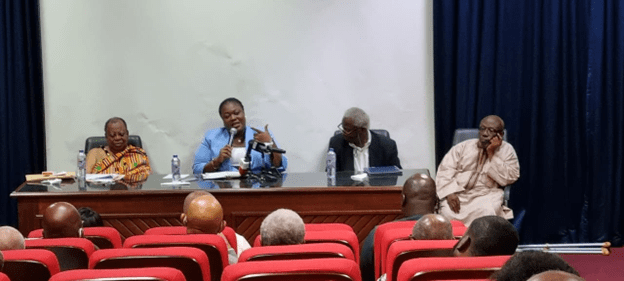Nana S.K.B. Asante, Omanhene of Asokore Mampong and a celebrated Ghanaian International Civil Servant, has said the country must improve the process and structure within which it conducts international negotiations.
He said that the evidence of bad negotiations was clear in the high volume of judgment debts and deleterious conditions placed on the state as an outcome of performance on some of these deals.
Nana Asante was speaking at the 2022 edition of the Annual Ghana Association of Former International Civil Servants (GAFICS) lecture in Accra.
GAFICS was established on October 14, 2000, as a Society of Retired International Civil Servants, predominantly from the United Nations system, the African Development Bank and the World Bank Group.
The annual lecture is an initiative of the Group, with lectures delivered by renowned figures in a chosen field which is the subject for the theme of the year in question.
The event was held in conjunction with the Ghana Institute for Management and Public Administration (GIMPA) and supported by the Institute of International Affairs, Ghana.
He said, “this situation is not peculiar to Ghana, as many developing countries faced with economic challenges can be forgiven for not paying particular attention to negotiation.”
The Omanhene, however, said Ghana should be an exception to this as “we have the capacity and expertise from several successful high-level negotiations that have been concluded positively and have added value.”
He said it was imperative that the country go back to learn what had worked and not worked and tap into the huge depth of capacity in talent pools like GAFICS, to put together a structure that allows for a centralized view of all negotiations.
“This structure must also be able to train, retain and direct a core team of experts that are mandated to be part of any negotiation as existed up until 1992, where luminaries like Madam Chinery Hesse served as Principal Secretary for External Aid of the Public Agreement Review Committee,” he added.
Mr Kwaku Osei-Bonsu, President of GAFICS said “the topic this year resonates, in the light of current events and we settled on this as many of us have been part of high-level negotiations and are often not pleased with the posture and
capacity of negotiating teams from developing countries like Ghana.”
Madam Asonaba Dapaah said, “It is important to note that the current leadership at the Attorney-General’s Department is keenly in-tune with the need for sustainable, multi-generational capacity for the State, the reason why the Government now has core teams that handle negotiations.
“The Attorney-General is keen on increasing capacity in the department on International Negotiations, and indeed I just returned from a World Bank sponsored session,” she added.
She said these things were processes and not an event, and the reason they still have considerable headroom to institutionalize some of the key developments.
She said, “I am proud to have been one of the pioneers in pushing for the mainstreaming of ADR in legal practice in Ghana and I think the same path must be explored in mainstreaming International Negotiations in legal education.” of international negotiations.”
Mr. Tawia Akyea, a Distinguished Fellow at the Institute for International Affairs, Ghana, said, “we need to be serious about negotiations as a country, and we need to consider how to address this issue in a sustainable manner and no country can survive on its own.”
He said under the rules-based order and given the current global framework, Ghana could only win advantage through the power of negotiation and not by might.
Mr Akyea underscored the need for lawyers to be at the forefront of such negotiations, as most negotiations by the government or other parastatals resulted in a legal contract.
He noted that the arbitration of any disagreements on said contracts often happened in a legal setting, thus the need to involve lawyers in the multi-disciplinary teams early.
Mr. Akyea said, “it is a pity that we have not done well to tap into the knowledge and capacity that was built in high level international negotiations like the VALCO / VRA negotiations of the 80’s.”
He said luminaries like Prof. Akilakpa Sawyerr, Mr. Kwame Asante and Mr. Fui Tsikita thankfully were still around, and the country should tap into their depth of knowledge into a body of work for instruction for upcoming technocrats.
Source: newsghana.com.gh

